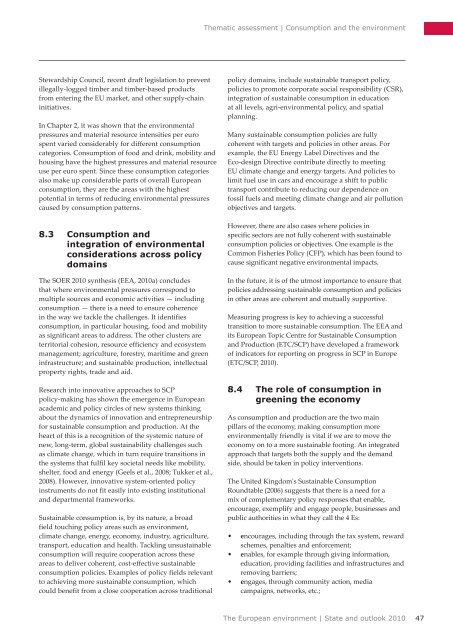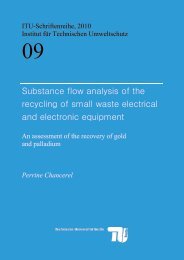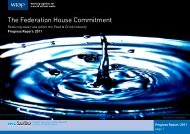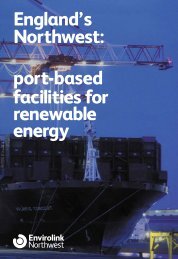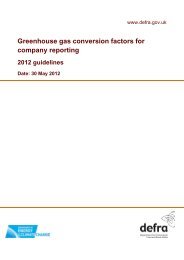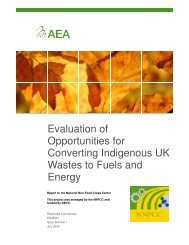Consumption and the environment (SOER2010) - European ...
Consumption and the environment (SOER2010) - European ...
Consumption and the environment (SOER2010) - European ...
You also want an ePaper? Increase the reach of your titles
YUMPU automatically turns print PDFs into web optimized ePapers that Google loves.
Thematic assessment | <strong>Consumption</strong> <strong>and</strong> <strong>the</strong> <strong>environment</strong><br />
Stewardship Council, recent draft legislation to prevent<br />
illegally‐logged timber <strong>and</strong> timber‐based products<br />
from entering <strong>the</strong> EU market, <strong>and</strong> o<strong>the</strong>r supply‐chain<br />
initiatives.<br />
In Chapter 2, it was shown that <strong>the</strong> <strong>environment</strong>al<br />
pressures <strong>and</strong> material resource intensities per euro<br />
spent varied considerably for different consumption<br />
categories. <strong>Consumption</strong> of food <strong>and</strong> drink, mobility <strong>and</strong><br />
housing have <strong>the</strong> highest pressures <strong>and</strong> material resource<br />
use per euro spent. Since <strong>the</strong>se consumption categories<br />
also make up considerable parts of overall <strong>European</strong><br />
consumption, <strong>the</strong>y are <strong>the</strong> areas with <strong>the</strong> highest<br />
potential in terms of reducing <strong>environment</strong>al pressures<br />
caused by consumption patterns.<br />
8.3 <strong>Consumption</strong> <strong>and</strong><br />
integration of <strong>environment</strong>al<br />
considerations across policy<br />
domains<br />
The SOER 2010 syn<strong>the</strong>sis (EEA, 2010a) concludes<br />
that where <strong>environment</strong>al pressures correspond to<br />
multiple sources <strong>and</strong> economic activities — including<br />
consumption — <strong>the</strong>re is a need to ensure coherence<br />
in <strong>the</strong> way we tackle <strong>the</strong> challenges. It identifies<br />
consumption, in particular housing, food <strong>and</strong> mobility<br />
as significant areas to address. The o<strong>the</strong>r clusters are<br />
territorial cohesion, resource efficiency <strong>and</strong> ecosystem<br />
management; agriculture, forestry, maritime <strong>and</strong> green<br />
infrastructure; <strong>and</strong> sustainable production, intellectual<br />
property rights, trade <strong>and</strong> aid.<br />
Research into innovative approaches to SCP<br />
policy‐making has shown <strong>the</strong> emergence in <strong>European</strong><br />
academic <strong>and</strong> policy circles of new systems thinking<br />
about <strong>the</strong> dynamics of innovation <strong>and</strong> entrepreneurship<br />
for sustainable consumption <strong>and</strong> production. At <strong>the</strong><br />
heart of this is a recognition of <strong>the</strong> systemic nature of<br />
new, long‐term, global sustainability challenges such<br />
as climate change, which in turn require transitions in<br />
<strong>the</strong> systems that fulfil key societal needs like mobility,<br />
shelter, food <strong>and</strong> energy (Geels et al., 2008; Tukker et al.,<br />
2008). However, innovative system‐oriented policy<br />
instruments do not fit easily into existing institutional<br />
<strong>and</strong> departmental frameworks.<br />
Sustainable consumption is, by its nature, a broad<br />
field touching policy areas such as <strong>environment</strong>,<br />
climate change, energy, economy, industry, agriculture,<br />
transport, education <strong>and</strong> health. Tackling unsustainable<br />
consumption will require cooperation across <strong>the</strong>se<br />
areas to deliver coherent, cost‐effective sustainable<br />
consumption policies. Examples of policy fields relevant<br />
to achieving more sustainable consumption, which<br />
could benefit from a close cooperation across traditional<br />
policy domains, include sustainable transport policy,<br />
policies to promote corporate social responsibility (CSR),<br />
integration of sustainable consumption in education<br />
at all levels, agri‐<strong>environment</strong>al policy, <strong>and</strong> spatial<br />
planning.<br />
Many sustainable consumption policies are fully<br />
coherent with targets <strong>and</strong> policies in o<strong>the</strong>r areas. For<br />
example, <strong>the</strong> EU Energy Label Directives <strong>and</strong> <strong>the</strong><br />
Eco‐design Directive contribute directly to meeting<br />
EU climate change <strong>and</strong> energy targets. And policies to<br />
limit fuel use in cars <strong>and</strong> encourage a shift to public<br />
transport contribute to reducing our dependence on<br />
fossil fuels <strong>and</strong> meeting climate change <strong>and</strong> air pollution<br />
objectives <strong>and</strong> targets.<br />
However, <strong>the</strong>re are also cases where policies in<br />
specific sectors are not fully coherent with sustainable<br />
consumption policies or objectives. One example is <strong>the</strong><br />
Common Fisheries Policy (CFP), which has been found to<br />
cause significant negative <strong>environment</strong>al impacts.<br />
In <strong>the</strong> future, it is of <strong>the</strong> utmost importance to ensure that<br />
policies addressing sustainable consumption <strong>and</strong> policies<br />
in o<strong>the</strong>r areas are coherent <strong>and</strong> mutually supportive.<br />
Measuring progress is key to achieving a successful<br />
transition to more sustainable consumption. The EEA <strong>and</strong><br />
its <strong>European</strong> Topic Centre for Sustainable <strong>Consumption</strong><br />
<strong>and</strong> Production (ETC/SCP) have developed a framework<br />
of indicators for reporting on progress in SCP in Europe<br />
(ETC/SCP, 2010).<br />
8.4 The role of consumption in<br />
greening <strong>the</strong> economy<br />
As consumption <strong>and</strong> production are <strong>the</strong> two main<br />
pillars of <strong>the</strong> economy, making consumption more<br />
<strong>environment</strong>ally friendly is vital if we are to move <strong>the</strong><br />
economy on to a more sustainable footing. An integrated<br />
approach that targets both <strong>the</strong> supply <strong>and</strong> <strong>the</strong> dem<strong>and</strong><br />
side, should be taken in policy interventions.<br />
The United Kingdom's Sustainable <strong>Consumption</strong><br />
Roundtable (2006) suggests that <strong>the</strong>re is a need for a<br />
mix of complementary policy responses that enable,<br />
encourage, exemplify <strong>and</strong> engage people, businesses <strong>and</strong><br />
public authorities in what <strong>the</strong>y call <strong>the</strong> 4 Es:<br />
• encourages, including through <strong>the</strong> tax system, reward<br />
schemes, penalties <strong>and</strong> enforcement;<br />
• enables, for example through giving information,<br />
education, providing facilities <strong>and</strong> infrastructures <strong>and</strong><br />
removing barriers;<br />
• engages, through community action, media<br />
campaigns, networks, etc.;<br />
The <strong>European</strong> <strong>environment</strong> | State <strong>and</strong> outlook 2010<br />
47


